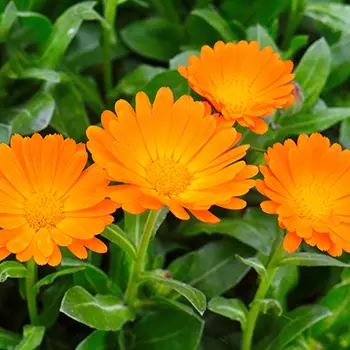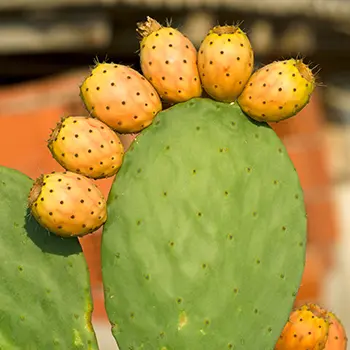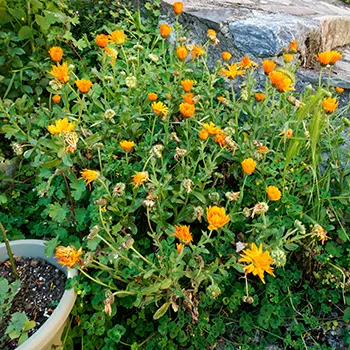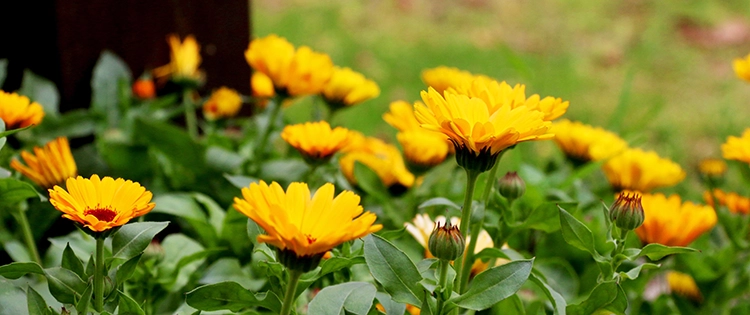Calendula seems like a mouthful, but most of you have probably admired this colorful, flowering plant for years without knowing its name or perhaps calling it by another name: pot marigold. Not the same as your typical marigolds (though those can also be beneficial), calendula are in the same general family and often look very similar. Still unsure if you want to grow these pretty posies? Let’s start convincing you.
Plants that Calendula Benefits
Much like other marigolds, calendula will benefit plants by driving away aphids and other leaf-crunching insects that can easily ruin your garden. However, the biggest difference is that calendula also keep plants like tomatoes and carrots safe while so many other plants will allow the common predators of these plants to run rampant.
Nightshades, root vegetables, and salad greens find calendula an easy plot mate and will benefit heavily from the fact that the predatory insects of these plants just cannot stand the smell and oil of calendula.
Plants to Avoid
This is tricky. In all honesty, few plants will do poorly near a calendula plant. Again, their main frame of work is setting off an odor and an oil that predatory insects really dislike. In fact, beneficial pollinators love calendula and will visit them time and time again, often doing their job with other plants in the meantime.
Which plants should you avoid placing near calendula? Anything that is going to have a problem sharing a plot with something that needs heavy watering every now and again.
The worst example that I have for you is someone who was working on growing cacti fruit. They were having trouble with various predatory insects going for the fruits and thought that calendula would be fine if it were potted and they were diligent in making certain that spillover from the calendula’s saucer was not an issue for their arid, spiky friends.
The problem? The calendula continued to secrete oil and perfume, it maintained enough moisture in the air around it that the cacti were having a lot of trouble holding on to their fruits. This particular gardener lost three well-maintained cacti because of the humidity that surrounded the calendula. Which was really too bad; their true passion was, indeed, cacti.
Keep in mind that calendula is a European to North Asia plant. If you place a grow cone over it, it’ll have condensation on it within a few days at the very most. That includes in situations where you would be watering from the bottom of the plant. I’ll never be the sort of person who states that plants can only be with like-situated plants, but be aware that there is a significant risk with calendula and arid plants often relating to root rot in the arid plants.
Other Benefits of Growing Calendula
Calendula is a wonderful plant, and not only for your garden. This pretty flower (and its greens) has been used for medicinal and cosmetology for time past historical understanding. Essentially, since we’ve had access to this plant, we’ve been using it for an enormous array of purposes.
The primary focus of calendula’s medical effectiveness is that of promoting the diffuse of swelling and overall healthier tissue by promoting better circulation within the person using it. More often than not, you’ll find that this plant is dried and placed in clear gel caps for use. However, it can be taken orally or used as a balm, or even a tincture if so desired. Calendula is a very flexible plant and it continues to be so when dealing with medicinal qualities.
You’ll also find that calendula is an excellent addition to your medicinal cabinet for oral soreness. While this plant won’t heal a cavity (nothing can do that), you can use it much as you would willow bark to reduce inflammation and soreness of a tooth or your gums simply by chewing it. You may find the flavor pretty harsh, as many do, but chewing it directly in the area affected has a quicker reaction time than taking a gel cap.
Related: Natural Remedies From The Amish
Calendula can also be used to assist in better gut health. Again, circulation is this plant’s main game and it’s full of flavonoids to assist in exactly that; better heart health, increased blood flow, and so on and so forth. In that direction, the pulp and fiber of this plant (when eaten) encourage both better circulation throughout the gastric tract as well as bulking the gut and assisting in moving it along, cleaning the tract as it goes. If you do decide to eat a big bowl of these greens and flowers, simply be aware that they will do what they are intended to do.
Those who are on coagulation medication or heart medication should speak with their doctor before using calendula. Additionally, anyone who may be sensitive for stomach reasons (Crohn’s, IBS, etc) should also speak with a medical professional before taking it. This means taking a trip to a traditional doctor, not an herbalist.
While both are valid, a traditional doctor has a far better capacity to understand precisely what is taking place on your medical chart with your prescriptions via blood work results and other diagnostic tools. Your herbalist doesn’t have access to these things.
Related: You Will Never Run Out Of Medicine If You Grow This
Please speak with your doctor before starting anything new if you are experiencing any sort of medical issue. Remember that we cannot access your medical records, either, and speak only in broad strokes regarding what these incredible plants are known for.
That said, calendula is a wonderful addition to your garden for so many reasons: pest control, medicinal qualities, and the absolute beauty of the plant itself. I highly recommend putting in a few of them this season to see if you enjoy growing them; I’m pretty sure that you will.
What has your experience been with Calendula? Have you made it a permanent plant to include in your gardens? Or have you decided on another plant to grow instead of that and if so, why? Comment down below; I’d love to hear from you and listen to your experience with this wonderful flower. And remember, Happy Gardening!
Native American Remedies That We Lost To History (Video)










